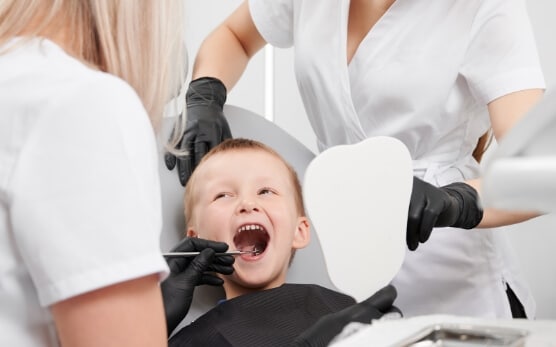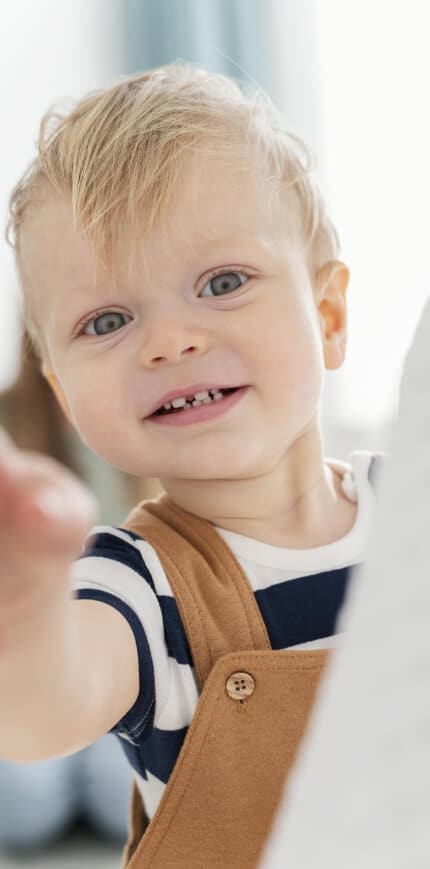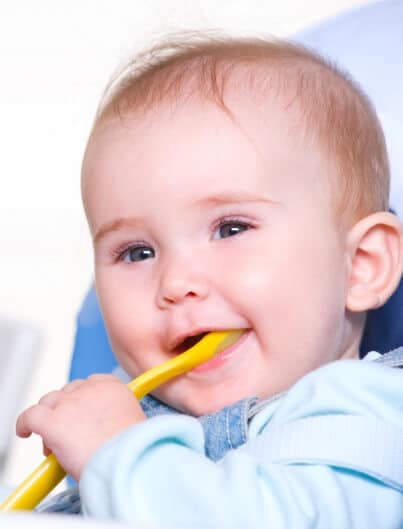Children’s Dentistry
What is Children’s Dentistry?
Also known as paediatric dentistry, children’s dentistry involves the general health, cleaning, and education of teeth for children from infancy right through to adolescence.
Helping your child take care of their teeth is important from an early age so they can develop regular oral hygiene habits.
The dentists at Good Samaritan Medical & Dental Centre are here to help your child maintain healthy gums and teeth as soon as their teeth arrive.


When should my child first go to the dentist?
It’s recommended your child’s first dental visit is between the ages of two and three, as at this age your child is old enough to understand what is happening, and be able to sit during the appointment.
Here are some tips to help prepare your child for their first trip to the dentist:
- Allow your child to visit the dentist with you or older siblings. This will help them in understanding the importance and safety of dentistry.
- Try not to use words such as ‘drill’ or ‘needle’ as this can easily scare your child. The dentist will use child friendly words and phrases to help your child.
- Teach your child about the positive experiences of dentistry, such as counting teeth and learning oral hygiene.
- Ensure the appointment is at a suitable time for your child to be awake, aware, and cooperative. Usually, mornings are best.
- Ensure your child understands that dental visits are an accepted routine, not a special visit.
- Arrive to the appointment early to allow your child time to become familiar with new surroundings.
No one knows your child better than you do, and our goal is to make this process as comfortable as possible for your child, so it’s best you inform the dental staff of any medical conditions, past incidents, or difficulties which may affect your child’s participation in the appointment. This will allow the dentist to adjust their approach to ensure your child has a positive experience at their first dental visit.
If your child isn’t ready for their first visit, something you can do with them at home is clean their teeth as soon as they arrive. You can do this by wiping them with a soft cloth or brushing them with a soft toothbrush and water.
Once your toddler has had their successful first dental examination, you should schedule their next one for six months’ time. Children’s dentist appointments should be once every six months, as this allows for regular dental care to be performed, such as dental examinations, cleaning, fluoride treatment, and x-rays.
Don’t be afraid to bring you child back sooner than six months if you have any concerns about their oral health. You may need to seek further advice if:
- your child’s gums are bleeding, red, or swollen
- there is pus coming from their gums
- they have a bad taste in their mouth that won’t go away
- they have abscesses (these can be under the teeth and are usually very painful)
What should I look for in my child’s teeth & gums?
Teething
Caring for your child’s oral hygiene during teething, their baby teeth, and their adult teeth, is one of the most important things you can do for your child.
You may notice your baby is about to start teething if:
- their sleeping and eating patterns change
- they become fussy
- they develop rashes, runny nose, or start drooling
- a blue-grey bubble appears on the gum where the tooth will appear
Here are some ways to keep your baby comfortable during this time:
- massage their gums with clean fingers or a soft, wet cloth
- offer them teething rings that are safe for the fridge or freezer – chilled (not frozen) objects in the mouth can relieve teething discomfort
- keep their mouth dry while your baby is drooling, as the skin around the mouth can become irritated
- unsweetened teething rusks or sugar-free teething biscuits are great for your baby to suckle on during the teething process
- pain-relieving medication such as paracetamol works well for infants that are in pain
Baby Teeth
Caring for baby teeth is just as important as caring for your adult teeth. It ensures your child can chew food comfortably and is important for speech development as they grow.
Once your child develops their first baby tooth, it is important to brush regularly with a soft wet toothbrush and water. Continue this up until their first dental visit, where you can introduce a low-fluoride toothpaste, encouraging them to spit the toothpaste out at the end (instead of swallowing).
At around age two, you can encourage your toddler to brush their own teeth. Once your child is comfortable brushing their own teeth, this is when you can start teaching them to floss on their own.
Remember to bring your child in for regular dental check-ups once every six months.
Adult Teeth
Your child can begin developing their adult teeth as early as six years of age. These are most commonly their molars. The timeline for adult teeth erupting differs, but typically occurs between the ages of six and twelve, not including wisdom teeth which develop later in life.
Caring for your child’s new adult teeth is the same as caring for your own. Continue regular dental check-ups to ensure no issues arise and to educate your child on the importance of oral hygiene.
Cavities
Cavities, also known as tooth decay, is the breakdown of tooth enamel, and over time can appear as a dark spot over the tooth. Holes or craters can also form in the teeth. Cavities are common in children and are often caused by sugars and starches mixing with the bacteria that lives in the mouth.
Something to look out for at home is whether your child is chewing or drinking properly, especially hot or cold items, as tooth sensitivity is a common symptom of cavities, and the dentist will look for any cavities as part of their dental examination.
A diet that’s high in sugars and starches causes more risk of cavities. It is important to maintain a healthy, nutritious, and balanced diet to prevent the development of cavities.
Great oral hygiene and regular dental checkups will also help in the prevention of tooth decay, as well as dental sealants and fluoride treatments.

How do I care for my child’s oral hygiene?
It’s important to start cleaning your baby’s teeth as soon as they arrive, & to start teaching your child healthy teeth cleaning habits as they get older.
Toothpaste and small-headed toothbrushes made specifically for babies and/or children can be found at your local chemist or supermarket. You can start using low-fluoride toothpaste on your child’s teeth at around two years old, but you should still be cleaning their teeth with water prior to this.
It’s recommended to teach your child to brush their own teeth as soon as they start learning to look after themselves in other ways, such as dressing themselves or brushing their hair. Get them to watch you or older siblings brush their teeth so they can see how it’s done, then supervise them when they do it themselves.
Make the teeth cleaning experience fun for them. Have them choose their own toothbrush in their favourite colour, or with their favourite cartoon character on it, and their flavour of toothpaste. Allowing your child to participate in this part of oral hygiene will encourage them to want to clean their teeth properly.
Some helpful tips to encourage your child to brush their teeth include:
- playing music and having a dance party while they brush
- brush your teeth with them and inspect their teeth afterwards, then have them inspect your teeth
- make a game out of it: whoever has the cleanest teeth wins!
- have your child brush your teeth, and you brush their teeth
How do I know if my child needs orthodontic treatment?
Orthodontics is the dental practice that specialises in the development of children’s teeth, bite, and jaw. Orthodontists focus on the prevention and correction of developmental irregularities within the teeth and jaw, and also have specialised training in facial abnormalities and jaw disorders.
It is recommended that your child visits an orthodontist between the ages of seven and ten, whether they have noticeable dental issues or not. At this age, adult molars begin to develop, the front teeth start to erupt, and the bite of the back teeth is established.
By conducting an orthodontic examination early in your child’s life, there is a possibility of avoiding braces if the orthodontist believes the issue can be solved before the jaws stop growing. Early examinations help ensure limited dental and development issues occurring and can simplify orthodontic treatment later in life.
Your child may need orthodontic treatment if:
- bacteria is hidden in the pockets of misaligned teeth, causing issues keeping their teeth clean.
- speaking difficulties arise due to misaligned teeth
- misaligned teeth impacts your child’s confidence or facial profile
- pain is caused by teeth that continue to grow misaligned or misplaced
- your child has difficulty biting and chewing their food due to the alignment of their teeth
It’s important to book your child in for an orthodontic examination if you start to notice symptoms of misaligned teeth or jaw.
Children’s Dental Benefit Schedule
– What is it?
The Children’s Dental Benefit Schedule (CDBS) is a program run by the Australian Government that offers eligible children up to $1000 in benefits for basic dental services each year.
These services can include:
- Dental examinations
- X-rays
- Cleaning
- Fissure sealings
- Fillings
- Root canal treatments
- Extractions
Orthodontics and cosmetic dental procedures are not included.
For your child to be eligible, they must be between 0-17 years of age on the first of January in the calendar year, be eligible for Medicare, and be getting an eligible payment, or have a parent getting a payment, from Centrelink at least once a year (including Family Tax benefit Part A).
When you've got a healthy smile, you're all set!